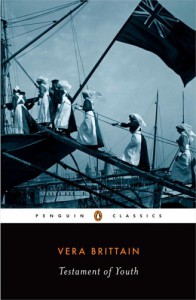Paeans to my favorite books - V: Testament of Youth

I have a few pet peeves when it comes to history, but my biggest by far is the question of why the world did not stop Adolf Hitler before he plunged Europe into war. I find it a frustrating question on a number of levels. At its most basic, it's an abuse of hindsight, expecting people in the 1930s to anticipate horrors that were simply unimaginable at the time (if you think I'm wrong about this, just look at the people today who believe that it can't possibly happen again). But at the same time it also reflects a degree of historical ignorance: the reason why so many Europeans avoided war until it was unavoidably thrust upon them was because most of them had already lived through a devastating conflict that had claimed tens of millions of lives. Is it any wonder that they were so loath to repeat the experience?
When I encounter people who don't appreciate just how traumatizing the First World War was for a generation of Europeans, I encourage them to read this book. It's the memoir of an upper-middle-class woman, whose comfortably sheltered existence was transformed by the war. Over the course of it, she lost the three men who mattered most to her: her fiancé Roland Leighton, her close friend Victor Richardson, and her brother Edward, all of whom were killed in combat. Her words express the impact of such loss better than any other work about the war that I have ever read. In this respect her account is superior to the memoirs of the men who served on the front lines, because for most people who lived through it the war was not experienced in the mire of the trenches but at home, with the anxious tension of waiting punctuated by the sudden revelation of loss that had occurred days or even weeks before.
Yet Brittain's own experience was not confined to the home front. In the summer of 1915 she left university to serve as a nurse with the Voluntary Aid Detachment, which ultimately led to her service in a field hospital in France. There she saw firsthand the effects of war on young men like her fiancé and brother, not just once but for hours on end every day for months. Her account manages to convey both the horror of this experience and the mind-numbing constancy of it, showing how it changed her forever by making her a pacifist, as she committed herself to fighting to save others from the loss that she had experienced so profoundly at such a young age.
Reading Brittain's book makes it clear what are the costs of war, costs that in the case of the First World War had been paid by nearly everyone. Her eloquent prose personalizes it and conveys the emotional impact in a way that the statistical tallies never could, showing how those numbers represent very real lives the promise of which was cut tragically short. For so many of the survivors the best way of honoring that sacrifice was ensuring that it did not happen again. The tragedy in this respect was these efforts failed, not that they were made or that people could not understand how others could live through the same conflict and draw other, more terrible conclusions from it.






